
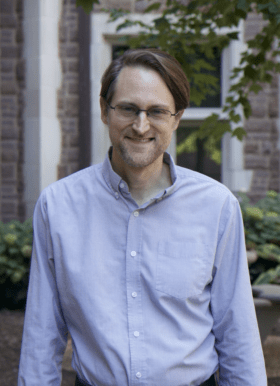
Thomas Rodebaugh
Professor, Director of Clinical Training
- Phone: 314-935-8631
- Email: rodebaugh@nospam.wustl.edu
219 Somers Family Hall
CV
Professor Rodebaugh is a clinical psychologist with a focus on anxiety disorders in adults, particularly generalized social anxiety disorder. However, much of his current work focuses on bothersome tinnitus and the use of cognitive behavioral therapy for that issue. He is also interested in treatment outcome and process more generally. Dr. Rodebaugh has recently focused on intensive longitudinal data and methods of modeling processes in individuals. He has over one hundred peer-reviewed publications. His research has focused on assessment, treatment, cognitive factors (e.g., attention bias), interpersonal processes, friendship, loneliness, and the enhancement of exposure treatment across the anxiety disorders. He has a long-standing interest in the selection of appropriate statistical models (e.g., structural equation models; item response theory models; network models; idiographic models) for evaluating measures and testing hypotheses. Dr. Rodebaugh’s primary clinical focus is on supervising graduate students who provide psychotherapy at the department’s Psychological Services Center. Dr. Rodebaugh provides supervision in cognitive behavioral therapy and other empirically supported treatments. He is also the Director of Clinical Training for the Clinical Program. Outside of work, Dr. Rodebaugh also plays the guitar and gardens. Both badly.
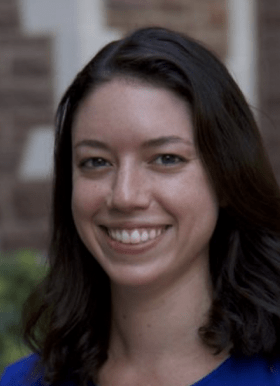
Madelyn Frumkin, MA
Graduate Student
- Email: mfrumkin@wustl.edu
Madelyn Frumkin (B.A., University of North Carolina at Chapel Hill) entered graduate school in August 2017. Before joining the Anxiety and Psychotherapy Laboratory, she spent two years working as a research coordinator at the Massachusetts General Hospital Center for Anxiety and Traumatic Stress Disorders. Madelyn’s current research focuses primarily on using ambulatory assessment data to improve understanding and prediction of chronic pain conditions. She is additionally interested in the interplay between psychological and physical symptoms, as well as using data-driven approaches to personalize psychotherapy. Madelyn’s research is supported by a Predoctoral Individual National Research Service Award from the National Institute on Mental Health (F31MH124291), a Dissertation Research Award from the American Psychological Association, and a Graduate Student Research Scholarship from the American Psychological Foundation/Council of Graduate Departments of Psychology. In her spare time, Madelyn enjoys the great outdoors, cooking projects, sourdough bread baking, and sitcoms.
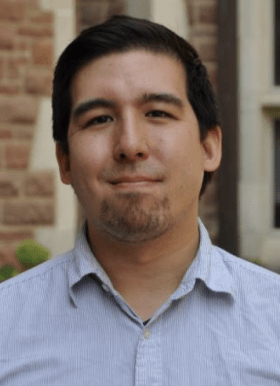
Jason T. Grossman, MA
Graduate Student
- Email: jgrossman@wustl.edu
Jason Grossman (B.S., University of California, San Diego) entered graduate school in August 2017. Before joining the Anxiety and Psychotherapy Laboratory, he worked as a staff research associate with the Integrated Substance Abuse Programs at the University of California, Los Angeles. While there, he worked on a number of studies involving criminal justice, cannabis cessation, and anxiety with comorbid substance use. Jason is interested in investigating mHealth app use on symptoms of social anxiety via intensive longitudinal data, examination of the interplay between social anxiety and cannabis, the role of fear of positive evaluation in social situations, and medication-enhanced treatment for social anxiety. In his spare time, Jason enjoys hiking, cycling, and playing games of all sorts.
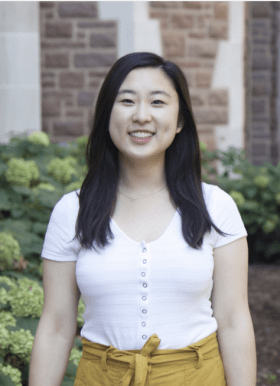
Jin Shin, MA
Graduate Student
- Email: jin.shin@wustl.edu
Jin Shin joined the Anxiety and Psychotherapy Laboratory in August 2019. After she graduated from Dartmouth College in 2017 with a B.A in Neuroscience, she spent two years working as a research coordinator at the Massachusetts General Hospital OCD and Related Disorders Program. Her primary projects at MGH included a study that examined the neural mechanisms of fear extinction in patients with OCD that were undergoing CBT, and a study that assessed the efficacy of fMRI-guided TMS for individuals with OCD. Currently, Jin is interested in understanding cognitive factors and mechanisms that maintain meaningful change in anxiety disorders. She is also interested in the use of fMRI techniques and ecological momentary assessment tools to create network and idiographic models and predict individual response to treatment. In her free time, Jin enjoys hiking, pottery, and finding new places to eat brunch.
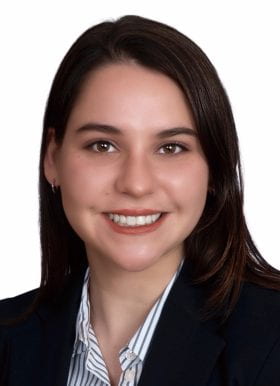
Gabrielle Messner, BA
Graduate Student
- Email: gabriellemessner@wustl.edu
Gabrielle (Gabby) Messner (she/her/hers) entered graduate school and joined the Anxiety and Psychotherapy Laboratory in August 2022. Gabby graduated from Barnard College in 2020 with a Bachelor of Arts in psychology. After earning her B.A., she spent two years working as a research coordinator for the Center for OCD & Related Disorders at Columbia University Irving Medical Center. Her primary projects included (1) an fMRI study that sought to identify reproducible biosignatures of obsessive-compulsive profiles across five international sites and (2) a clinical trial in adults with OCD examining whether baseline neuroinflammation predicted clinical outcomes from a course of anti-inflammatory medication. Currently, Gabby is interested in the neurocognitive mechanisms contributing to anxiety and obsessive-compulsive disorders and using this knowledge to develop more precise and effective treatments. Outside of the lab, Gabby enjoys playing bass, listening to live music, hiking, going to antique shops, and losing at bar trivia.

Julie Levitan, BA
Graduate Student
- Email: j.m.levitan@wustl.edu
CV
Julie Levitan joined the Anxiety and Psychotherapy Laboratory in August 2021. After graduating from the University of Pennsylvania with a B.A. in English and Creative Writing, she completed a post-baccalaureate program in psychology at U.C. Berkeley. During that time she worked as a research assistant in two laboratories and volunteered at the San Francisco VA Health Care System, where she studied idiographic methods and person-specific symptom dynamics, emotion-related impulsivity and speech disfluency, and the use of psychophysiological data in prolonged-exposure therapy for PTSD. Currently, Julie is interested in using mixed methods and intensive longitudinal data to study the relationship between internalizing symptoms and interpersonal dynamics. She is also interested in using qualitative methods to better understand stakeholder attitudes toward clinical assessments and interventions. In her free time, Julie likes running, writing, and entertaining her rambunctious cat, Skinker.